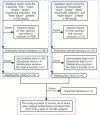Assessment of the safety of Roxadustat for cardiovascular events in chronic kidney disease-related anemia using meta-analysis and bioinformatics
- PMID: 38962312
- PMCID: PMC11220233
- DOI: 10.3389/fphar.2024.1380326
Assessment of the safety of Roxadustat for cardiovascular events in chronic kidney disease-related anemia using meta-analysis and bioinformatics
Abstract
Objective: This study compares the cardiovascular risk in anemic chronic kidney disease patients treated with Roxadustat versus erythropoietin stimulating agents (ESAs). It also explores the cardiovascular impact of Roxadustat.
Methods: We searched PubMed, EMBASE, Cochrane, Scopus, and Web of Science databases up to 13 August 2023, using terms such as "ESA," "Roxadustat," "MACE," "stroke," "death," "myocardial infarction," and "heart failure." Two researchers independently selected and extracted data based on predefined criteria. We assessed the risk of bias with the Cochrane tool and analyzed statistical heterogeneity using the Q and I2 tests. We conducted subgroup analyses by geographical region and performed data analysis with Stata 14.0 and RevMan 5.4 software. Data were sourced from the NCBI database by filtering for "Roxadustat" and "human," and differentially expressed genes were identified using R software, setting the significance at p < 0.01 and a 2-fold logFC, followed by GO enrichment analysis, KEGG pathway analysis, and protein interaction network analysis.
Results: A total of 15 articles encompassing 1,43,065 patients were analyzed, including 1,38,739 patients treated with ESA and 4,326 patients treated with Roxadustat. In the overall population meta-analysis, the incidences of Major Adverse Cardiovascular Events (MACE), death, and heart failure (HF) were 13%, 8%, and 4% in the Roxadustat group, compared to 17%, 12%, and 6% in the ESA group, respectively, with P-values greater than 0.05. In the subgroup analysis, the incidences were 13%, 11%, and 4% for the Roxadustat group versus 17%, 15%, and 5% for the ESA group, also with p-values greater than 0.05. Bioinformatics analysis identified 59 differentially expressed genes, mainly involved in the inflammatory response. GO enrichment analysis revealed that these genes are primarily related to integrin binding. The main pathways identified were the TNF signaling pathway, NF-κB signaling pathway, and lipid metabolism related to atherosclerosis. The protein interaction network highlighted IL1B, CXCL8, ICAM1, CCL2, and CCL5 as the top five significantly different genes, all involved in the inflammatory response and downregulated by Roxadustat, suggesting a potential role in reducing inflammation.
Conclusion: The meta-analysis suggests that the use of Roxadustat and ESA in treating anemia associated with chronic kidney disease does not significantly alter the likelihood of cardiovascular events in the overall and American populations. However, Roxadustat exhibited a safer profile with respect to MACE, death, and heart failure. The bioinformatics findings suggest that Roxadustat may influence integrin adhesion and affect the TNF and NF-κB signaling pathways, along with lipid and atherosclerosis pathways, potentially reducing inflammation.
Keywords: Roxadustat; cardiovascular events; erythropoietin stimulating agents; inflammatory responses; meta-analysis.
Copyright © 2024 Li, Jiang, Gu, Liu, Shang, Zhang, Pang and Li.
Conflict of interest statement
The authors declare that the research was conducted in the absence of any commercial or financial relationships that could be construed as a potential conflict of interest.
Figures











Similar articles
-
Safety of Roxadustat Versus Erythropoiesis-Stimulating Agents in Patients with Anemia of Non-dialysis-Dependent or Incident-to-Dialysis Chronic Kidney Disease: Pooled Analysis of Four Phase 3 Studies.Adv Ther. 2023 Apr;40(4):1546-1559. doi: 10.1007/s12325-023-02433-0. Epub 2023 Feb 7. Adv Ther. 2023. PMID: 36749544 Free PMC article. Clinical Trial.
-
Safety and Efficacy of Roxadustat for Anemia in Patients With Chronic Kidney Disease: A Meta-Analysis and Trial Sequential Analysis.Front Med (Lausanne). 2021 Aug 31;8:724456. doi: 10.3389/fmed.2021.724456. eCollection 2021. Front Med (Lausanne). 2021. PMID: 34532333 Free PMC article.
-
Efficacy and Safety of Roxadustat in Chinese Hemodialysis Patients: A Systematic Review and Meta-Analysis.J Clin Med. 2023 Mar 23;12(7):2450. doi: 10.3390/jcm12072450. J Clin Med. 2023. PMID: 37048535 Free PMC article. Review.
-
The Efficacy and Safety of Roxadustat for Anemia in Patients With Chronic Kidney Disease: A Meta-Analysis.Front Pharmacol. 2022 Apr 26;13:779694. doi: 10.3389/fphar.2022.779694. eCollection 2022. Front Pharmacol. 2022. PMID: 35559232 Free PMC article.
-
Efficacy and Cardiovascular Safety of Roxadustat for Treatment of Anemia in Patients with Non-Dialysis-Dependent CKD: Pooled Results of Three Randomized Clinical Trials.Clin J Am Soc Nephrol. 2021 Aug;16(8):1190-1200. doi: 10.2215/CJN.16191020. Clin J Am Soc Nephrol. 2021. PMID: 34362786 Free PMC article.
Cited by
-
The prognostic nutritional index as a predictor of cardiovascular and all-cause mortality in chronic kidney disease: a population-based analysis of NHANES data (1999-2018).Front Med (Lausanne). 2025 Jun 6;12:1589173. doi: 10.3389/fmed.2025.1589173. eCollection 2025. Front Med (Lausanne). 2025. PMID: 40547920 Free PMC article.
References
LinkOut - more resources
Full Text Sources
Research Materials
Miscellaneous

